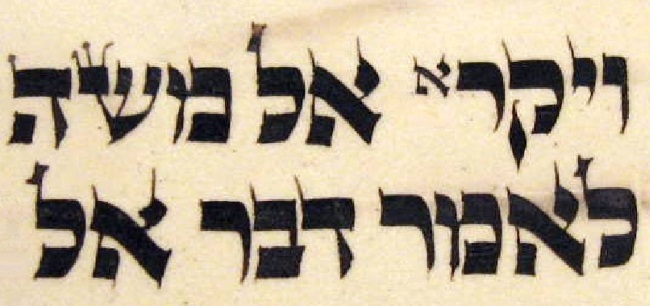(א) וַיִּקְרָ֖א אֶל־מֹשֶׁ֑ה וַיְדַבֵּ֤ר יְהוָה֙ אֵלָ֔יו מֵאֹ֥הֶל מוֹעֵ֖ד לֵאמֹֽר׃
״וַיִּקְרָא אֶל מֹשֶׁה וַיְדַבֵּר״, לָמָּה הִקְדִּים קְרִיאָה לְדִיבּוּר? לִימְּדָה תּוֹרָה דֶּרֶךְ אֶרֶץ, שֶׁלֹּא יֹאמַר אָדָם דָּבָר לַחֲבֵירוֹ אֶלָּא אִם כֵּן קוֹרֵהוּ. מְסַיַּיע לֵיהּ לְרַבִּי חֲנִינָא. דְּאָמַר רַבִּי חֲנִינָא: לֹא יֹאמַר אָדָם דָּבָר לַחֲבֵירוֹ אֶלָּא אִם כֵּן קוֹרֵהוּ. ״לֵאמֹר״, אָמַר רַבִּי (מוּסְיָא בַּר בְּרֵיהּ דְּרַבִּי מַסְיָא מִשְּׁמֵיהּ דְּרַבִּי מוּסְיָא) רַבָּה: מִנַּיִין לָאוֹמֵר דָּבָר לַחֲבֵירוֹ שֶׁהוּא בְּבַל יֹאמַר עַד שֶׁיֹּאמַר לוֹ: לֵךְ אֱמוֹר — שֶׁנֶּאֱמַר: ״וַיְדַבֵּר ה׳ אֵלָיו מֵאֹהֶל מוֹעֵד לֵאמֹר״.

(יג) מַה בֵּין נְבִיאֵי יִשְׂרָאֵל לִנְבִיאֵי אֻמּוֹת הָעוֹלָם, רַבִּי חָמָא בַּר חֲנִינָא וְרַבִּי יִשָּׂשׂכָר דִּכְפַר מַנְדִּי, רַבִּי חָמָא בַּר חֲנִינָא אָמַר אֵין הַקָּדוֹשׁ בָּרוּךְ הוּא נִגְלָה עַל אֻמּוֹת הָעוֹלָם אֶלָּא בַּחֲצִי דִּבּוּר, כְּמָה דְּתֵימַר (במדבר כג, ד): וַיִּקָּר אֱלֹהִים אֶל בִּלְעָם, אֲבָל נְבִיאֵי יִשְׂרָאֵל בְּדִּבּוּר שָׁלֵם, שֶׁנֶּאֱמַר: וַיִּקְרָא אֶל משֶׁה.
What's the difference between the prophets of Israel and the prophets of the rest of the nations of the world? . . . . Rabbi Chananyah says that when God appears to the other nations of the world, God does so with partial speech. As it says in Numbers: "God spok* to Balaam." But to the prophets of Israel, God speaks in complete speech, as it's written, "And God spoke to Moses"
(ה) רִבִּי יִצְחָק פָּתַח, (ויקרא א׳:א׳) וַיִקְרָא אֶל מֹשֶׁה וַיְדַבֵּר יְיָ' אֵלָיו מֵאֹהֶל מוֹעֵד לֵאמֹר. וַיִקְרָא אָלֶף זְעֵירָא, אֲמַאי. אֶלָּא בְּגִין לְאַחֲזָאָה מַאן הוּא הַהוּא דְּקָרָא, הַהוּא דְּשָׁרֵי בְּמַקְדְּשָׁא, וּכְדֵין זַמִּין לְמֹשֶׁה, כְּמַאן דְּזַמִּין אוּשְׁפִּיזָא. הָכָא א' זְעֵירָא, הָתָם א' רַבְּתָא, אָדָם שֵׁת אֱנוֹשׁ. (ס''א אדם) דָּא שְׁלִימוּ דְּכֹלָּא.
Rabbi Yitzchak opened [his discourse] with the verse: "And G‑d called to Moses, and spoke to him from the tent of meeting, saying." (Lev. 1:1) Why is the word "called" [in Hebrew, 'vayikra', spelled with] a small Aleph? The one who dwells in the sanctuary [the Shechinah, represented by small letters] is the one who called and invited Moses as one invites a guest. Here with a small Aleph and in another verse, "Adam, Seth, Enosh" (Chron. 1:1) ['Adam' is spelled with] a big Aleph, for Adam was the completion of all [creation].
א' דויקרא זעירא שמשה לא רצה לכתוב אלא ויקר כדרך שנא' בבלעם כאלו לא נראה לו השם אלא במקרה ואמר לו הקב''ה לכתוב גם באל''ף וכתבה קטנה.
Baal Turim
Moses wanted to write it without an aleph to hide, [out of humility,] the fact that G-d called him [warmly, with affection and love,] contrarily to the manner in which He called non Jewish prophets such as Bil'am [and Hagar], expressing that prophecy to them was just "an accidental event". The Torah wrote "called/encountered/appeared" for them without an aleph. Calling [with love] should be written with an aleph. G-d ordered Moses to write it with an aleph. [Out of humility] Moses wrote it with a small aleph.
He called to Moses: The alef of the word for "He called" (ויקרא), the first word in the Book of Leviticus, is written smaller than usual, alluding to Moses' humility even in the face of his own greatness and his selection by God for his exalter role in human history. In contrast, the alef in Adam's name (אדם) as the first word of the Book of Chronicles is written larger than usual, alluding to Adam's self-esteem as the acme of God's creation. Although it is both necessary and good to be aware of one's positive qualities, Adam allowed his self-esteem to degenerate into conceit, and this caused his downfall.
Moses rectified Adam's mistake. He recognized his greatness but nevertheless remained humble. His humility was not self-delusional but the result of simple reasoning. "I cannot take any credit for any of my gifts or accomplishments," he thought, "since they are all God-given. Indeed, were another person to have been given my potentials, he would have accomplished more and climbed greater heights than I have." He understood that true humility does not mean denigrating oneself but seeing the virtue in others.
We are all spiritual heirs of Adam and Moses. When we feel inadequate we must remember that we are Adam, with a big alef. When thoughts of "Who am I?" deter us from our task, we must recall that we are Adam, formed by God's own hands, and fully capable of caring for His garden. At the same time, we must recall that we are Moses, are thereby ensure that our self-assurance does not develop into conceit.
Moreover, if we remember the small alef, we, too, will merit to be called by God, and this revelation will provide us with the strength to answer God's call, drawing ourselves and the world at large closer to Him. This is the true essence of the sacrifices, whose laws are introduced by the lesson of the small alef.
(Likutei Sichot, vol. 17, pp. 7-8)
(א) ויקרא אל משה. לְכָל דִּבְּרוֹת וּלְכָל אֲמִירוֹת וּלְכָל צִוּוּיִים קָדְמָה קְרִיאָה, לְשׁוֹן חִבָּה, לָשׁוֹן שֶׁמַּלְאֲכֵי הַשָּׁרֵת מִשְׁתַּמְּשִׁין בּוֹ, שֶׁנֶּאֱמַר וְקָרָא זֶה אֶל זֶה (ישעיהו ו'), אֲבָל לִנְבִיאֵי אֻמּוֹת הָעוֹלָם נִגְלָה עֲלֵיהֶן בִּלְשׁוֹן עֲרָאִי וְטֻמְאָה, שֶׁנֶּאֱמַר וַיִּקָּר אֱלֹקִים אֶל בִּלְעָם (במדבר כ"ג):
(1) ויקרא אל משה AND [THE LORD] CALLED UNTO MOSES — All oral communications of the Lord to Moses whether they are introduced by דבר or by אמר or by צו were preceded by a call (to prepare him for the forthcoming address).
It is a way of expressing endearment, the mode used by the ministering angels when addressing each other, as it is said (Isaiah 6:3) “And one called unto another [and said, Holy, holy,
holy is the Lord of hosts]”.
To the prophets of the nations of the world, however, God revealed Himself with a term of happenstance and impurity as it say "God happened upon (ויקר) Bilam."
(the term ויקר, from the root ,קרה, is connected with מִקְרֶה which denotes “chance”, “occurrence”, and has also the meaning of “uncleanness”, by analogy with Deuteronomy 23:11: לא יהיה טהור מקרה לילה) (cf. Bereishit Rabbah 52:5).
(ט) וַיִּקְרָ֛א ה' אֱלֹקִ֖ים אֶל־הָֽאָדָ֑ם וַיֹּ֥אמֶר ל֖וֹ אַיֶּֽכָּה׃




